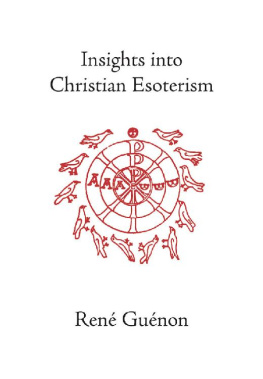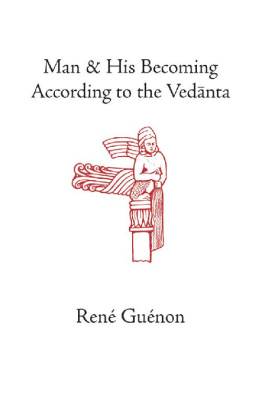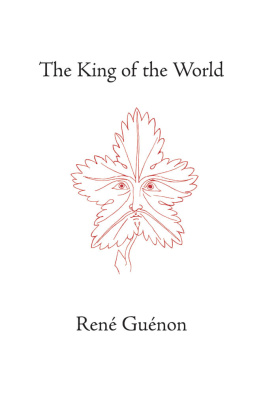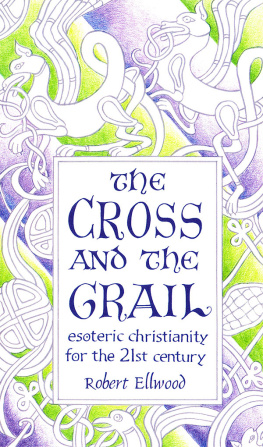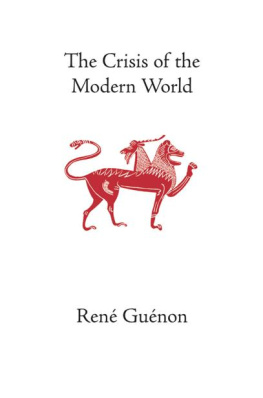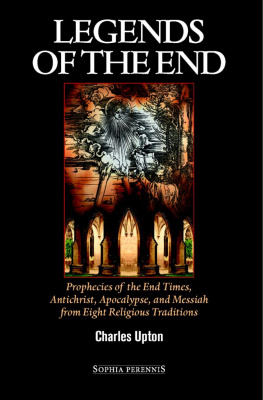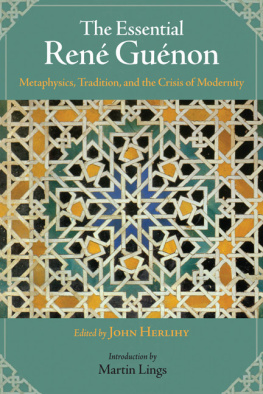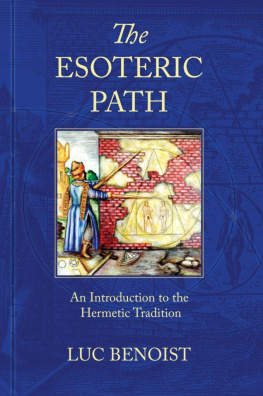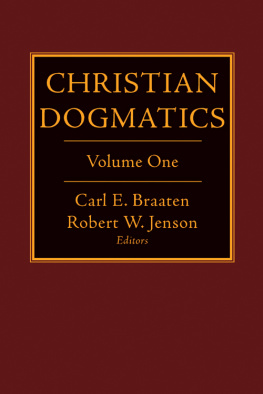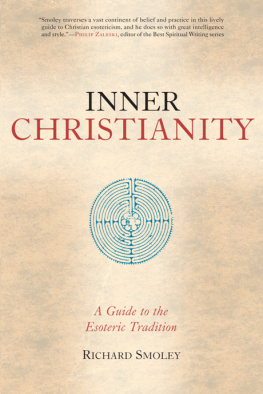COLLECTED WORKS OF REN GUNON
INSIGHTS INTO
CHRISTIAN ESOTERISM
REN GUNON
INSIGHTS INTO
CHRISTIAN ESOTERISM
Translator
Henry D. Fohr
Editor
Samuel D. Fohr
SOPHIA PERENNIS
HILLSDALE NY
Originally published in French as
Aperus sur lsotrisme chrtien
Les ditions Traditionnelles 1954
English translation Sophia Perennis 2001
First English Edition 2001
Second Impression 2004
All rights reserved
Series editor: James R. Wetmore
No part of this book may be reproduced or transmitted,
in any form or by any means, without permission
For information, address:
Sophia Perennis, P.O. Box 611
Hillsdale NY 12529
sophiaperennis.com
Library of Congress Cataloging-in-Publication Data
Gunon, Ren
[Aperus sur lsotrisme chrtien. English]
Insights into Christian esoterism / Ren Gunon ; translated by Henry D. Fohr ; edited by Samuel D. Fohr
p. cm. (Collected works of Ren Gunon)
Includes bibliographical references and index.
ISBN 0 900588 33 0 (pbk: alk. paper)
ISBN 0 900588 39 x (cloth: alk. paper)
1. Church historyMiddle Ages, 6001500 I. Fohr, S.D., 1943 II. Title.
BR253.G8 13 2001
270dc212001000432
THE PUBLISHER
GIVES SPECIAL THANKS TO
HENRY D. AND JENNIE L. FOHR
FOR MAKING THIS EDITION POSSIBLE
CONTENTS
EDITORIAL NOTE
The past century has witnessed an erosion of earlier cultural values as well as a blurring of the distinctive characteristics of the worlds traditional civilizations, giving rise to philosophic and moral relativism, multiculturalism, and dangerous fundamentalist reactions. As early as the 1920s, the French metaphysician Ren Gunon (18861951) had diagnosed these tendencies and presented what he believed to be the only possible reconciliation of the legitimate, although apparently conflicting, demands of outward religious forms, exoterisms, with their essential core, esoterism. His works are characterized by a foundational critique of the modern world coupled with a call for intellectual reform; a renewed examination of metaphysics, the traditional sciences, and symbolism, with special reference to the ultimate unanimity of all spiritual traditions; and finally, a call to the work of spiritual realization. Despite their wide influence, translation of Gunons works into English has so far been piecemeal. The Sophia Perennis edition is intended to fill the urgent need to present them in a more authoritative and systematic form. A complete list of Gunons works, given in the order of their original publication in French, follows this note.
The present volume consists of articles collected and published posthumously, to which has been added Gunons separate study Saint Bernard. When first published as an article, Christianity and Initiation (second chapter here) gave rise to some controversy because Gunon here reaffirmed against certain other traditionalist writers and various Christian intellectuals his denial of the efficacy of the Christian sacraments as rites of initiation, a point he had made in other books. Some closely related articles can be found in the companion volume The Esoterism of Dante. Apart from this and his monograph on St Bernard, Gunon devoted no single work to Christianity. His reserve in this respect is closely related to the role he assigns, in East and West and The Crisis of the Modern World, to the Western elite. It was incumbent on the spiritual elite of the Christian West, Gunon believed, to show that the intellectual and spiritual degeneracy of the West was not total and irremediable. It was only natural therefore that Gunon restricted himself to providing certain keys and pointers for further research, as far as the Christian tradition is concerned.
Gunon often uses words or expressions set off in scare quotes. To avoid clutter, single quotation marks have been used throughout. As for transliterations, Gunon was more concerned with phonetic fidelity than academic usage. The system adopted here reflects the views of scholars familiar both with the languages and Gunons writings. Brackets indicate editorial insertions, or, within citations, Gunons additions. Wherever possible, references have been updated, and English editions substituted.
The present translation is based on the work of Henry Fohr, edited by his son Samuel Fohr. Also consulted were translations by Jacques Philippe and Tony Brown. The text was checked for accuracy and further revised by Patrick Moore and Marie Hansen. For help with selected chapters thanks go to John Riess, John Champoux, Brian Latham, John Herlihy, Hubert and Rohini Schiff, Charles Upton, Brian Keeble, Rob Baker, and William Stoddart. A special debt of thanks is owed to Cecil Bethell, who revised and proofread the text at several stages and provided the index. Cover design by Michael Buchino and Gray Henry, based on a drawing of a fifth-centry mosaic in the Baptistry at Albenga, by Gunons friend and collaborator Ananda K. Coomaraswamy.
THE WORKS OF REN GUNON
Introduction to the Study of the Hindu Doctrines (1921)
Theosophy: History of a Pseudo-Religion (1921)
The Spiritist Fallacy (1923)
East and West (1924)
Man and His Becoming according to the Vedanta (1925)
The Esoterism of Dante (1925)
The Crisis of the Modern World (1927)
The King of the World (1927)
Spiritual Authority and Temporal Power (1929)
The Symbolism of the Cross (1931)
The Multiple States of the Being (1932)
The Reign of Quantity and the Signs of the Times (1945)
Perspectives on Initiation (1946)
The Great Triad (1946)
The Metaphysical Principles of the Infinitesimal Calculus (1946)
Initiation and Spiritual Realization (1952)
Insights into Christian Esoterism (1954)
Symbols of Sacred Science (1962)
Studies in Freemasonry and the Compagnonnage (1964)
Studies in Hinduism (1966)
Traditional Forms and Cosmic Cycles (1970)
Insights into Islamic Esoterism and Taoism (1973)
Reviews (1973)
Miscellanea (1976)
STRUCTURE AND CHARACTERISTICS OF THE CHRISTIAN TRADITION
CONCERNING SACRED LANGUAGES
We have had previous occasion to point out that the Western world has at its disposal no other sacred language than Hebrew, which is certainly quite a strange fact, and one that invites certain observations; for even if we cannot claim to resolve the diverse questions that arise on this subject, it is not devoid of interest. It is evident that if Hebrew can play this role in the West, it is because of the direct filiation that exists between the Judaic and Christian traditions and the incorporation of the Hebrew Scriptures into the sacred books of Christianity itself; but one may wonder how it happens that Christianity possesses no sacred language of its own, a truly exceptional fact that sets it apart from other traditions.
Here it is especially important not to confuse sacred languages with those that are simply liturgical: it would have been in traditions that are now lost and with which Christianity obviously has no affiliation.
The absence of a sacred language in Christianity becomes even more striking when we observe that the original text of the Hebrew Scriptures, which still exists, serves officially only as a basis for the Greek and Latin translations. From this we can appreciate some of the special difficulties that the study of the Christian tradition presents to anyone who does not wish to restrict himself simply to more or less superficial appearances.
Next page
